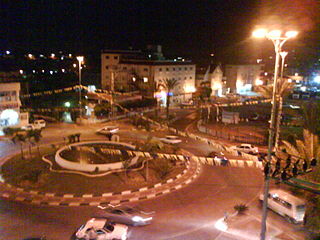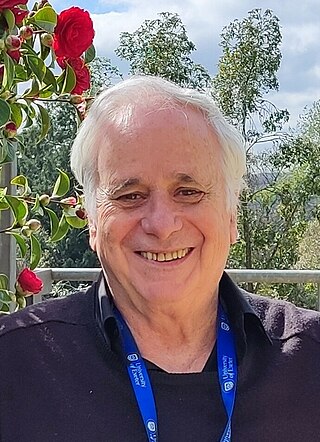
Tira is an Arab city in the Central District of Israel. Part of The Triangle, a concentration of Arab towns and villages adjacent to the Green Line, Tira is close to Kfar Saba. It is known for its weekly farmers' market and Arab cuisine.

Ilan Pappé is an Israeli historian, political scientist, and former politician. He is a professor with the College of Social Sciences and International Studies at the University of Exeter in the United Kingdom, director of the university's European Centre for Palestine Studies, and co-director of the Exeter Centre for Ethno-Political Studies. Pappé was also a board member of the Israeli political party Hadash, and was a candidate on the party list in the 1996 and 1999 Israeli legislative elections.

Palestinian literature refers to the Arabic language novels, short stories and poems produced by Palestinians. Forming part of the broader genre of Arabic literature, contemporary Palestinian literature is often characterized by its heightened sense of irony and the exploration of existential themes and issues of identity. References to the subjects of resistance to occupation, exile, loss, and love and longing for homeland are also common.

Nathan J. Brown is an American scholar of Middle Eastern law and politics at the George Washington University. Brown is Professor of Political Science and International Affairs at the Elliott School of International Affairs and the former director of its Institute for Middle East Studies.
Nur ad-Din Masalha commonly known in English as Nur Masalha is a Palestinian writer, historian, and academic.
Mohammed Abu-Nimer is an American expert on conflict resolution and dialogue for peace. He is a full professor at the American University School of International Service in International Peace and Conflict Resolution in Washington, DC, the largest school of international relations in the United States.
Jadaliyya ("dialectic") is an independent ezine founded in 2010 by the Arab Studies Institute (ASI) to cover the Arab World and the broader Middle East. It publishes articles in Arabic, French, English and Turkish, and is run primarily on a volunteer basis by an editorial team, and an expanding pool of contributors that includes academics, journalists, activists and artists.
Mouin Rabbani is a Dutch-Palestinian Middle East analyst specializing in the Arab-Israeli conflict and Palestinian affairs. Rabbani is based in Amman, Jordan and was a Senior Analyst for the International Crisis Group, the Palestine Director of the Palestine American Research Center, a Project Director for the Association of Netherlands Municipalities, and a volunteer and General Editor for Al Haq. Rabbani is currently a senior fellow at the Institute for Palestine Studies, a co-editor of Jadaliyya, and a Contributing Editor to the Middle East Report.

The Ethnic Cleansing of Palestine is a book authored by New Historian Ilan Pappé and published in 2006 by Oneworld Publications. The book is about the 1948 Palestinian expulsion and flight, which Pappe argues was the result of ethnic cleansing.

The Palestinian Declaration of Independence formally established the State of Palestine, and was written by Palestinian poet Mahmoud Darwish and proclaimed by Yasser Arafat on 15 November 1988 in Algiers, Algeria. It had previously been adopted by the Palestinian National Council (PNC), the legislative body of the Palestine Liberation Organization (PLO), by a vote of 253 in favour, 46 against, and 10 abstaining. It was read at the closing session of the 19th PNC to a standing ovation. Upon completing the reading of the declaration, Arafat, as Chairman of the PLO, assumed the title of President of Palestine. In April 1989, the PLO Central Council elected Arafat as the first President of the State of Palestine.

Since 1948, a number of countries and individuals have challenged the political legitimacy of the state of Israel and/or its occupation of Arab territories. Over the course of the Arab–Israeli conflict, the country's authority has been questioned on a number of fronts. Critics of Israel may be motivated by their opposition to the country's right to exist or, since the 1967 Arab–Israeli War, their disapproval of the established power structure within the Israeli-occupied territories. Increasingly, Israel has been accused of apartheid. Israel regards such criticism as an attempt to de-legitimize it.

Noura Saleh Erakat is a Palestinian activist, university professor, legal scholar, and human rights attorney. She is currently an associate professor at Rutgers University, specializing in international studies. Her primary focus being the Israeli–Palestinian conflict, she is a vocal critic of Israel.
Palestinian Salvadorans (Spanish: Salvadoreños Palestinos; Arabic: فلسطينيو السلفادور), are Salvadoran citizens of Palestinian descent or Palestine-born people residing in El Salvador. There are approximately 100,000 Salvadorans with Palestinian ancestry.
Nadim N. Rouhana is Professor of International Negotiation and Conflict Studies at The Fletcher School of Law and Diplomacy at Tufts University and the Founder and General Director of Mada al-Carmel, Arab Center for Applied Social Research in Haifa, which undertakes theoretical and applied social research and policy analysis to broaden knowledge and critical thinking about the Palestinians in Israel, equal citizenship, and democracy.

The Nakba is the ethnic cleansing of Palestinians through their violent displacement and dispossession of land, property, and belongings, along with the destruction of their society and the suppression of their culture, identity, political rights, and national aspirations. The term is used to describe the events of the 1948 Palestine war in Mandatory Palestine as well as the ongoing persecution and displacement of Palestinians by Israel. As a whole, it covers the fracturing of Palestinian society and the long-running rejection of the right of return for Palestinian refugees and their descendants.
Areej Sabbagh-Khoury is a Palestinian-Israeli sociologist, scholar, author, and educator. She is Senior Lecturer in the Department of Sociology and Anthropology at the Hebrew University of Jerusalem. She is most known for her scholarship on what she calls Zionist settler colonization and the Palestinian citizen population in Israel.

Zionism has been described by several scholars as a form of settler colonialism in relation to the region of Palestine and the Israeli–Palestinian conflict. This paradigm has been applied to Zionism by various scholars and figures, including Patrick Wolfe, Edward Said, Ilan Pappe, Noam Chomsky, and others who view Zionism as a form of settler colonialism. Many of Zionism's founders and leaders described their project as a colonial project, and major Zionist organizations and agencies central to Israel creation held names reflecting colonial identity.
Nakba denial is a form of historical denialism pertaining to the 1948 Palestinian expulsion and flight and its accompanying effects, which Palestinians refer to collectively as the "Nakba". Underlying assumptions of Nakba denial cited by scholars can include the denial of historically documented violence against Palestinians, the denial of a distinct Palestinian identity, the idea that Palestine was barren land, and the notion that Palestinian dispossession were part of mutual transfers between Arabs and Jews justified by war.
Shu'un Filastiniyya is a quarterly theoretical journal published by the Palestine Research Center which is one of the agencies of the Palestine Liberation Organization (PLO). The journal has been in circulation since 1971 with some interruptions. It is based in Ramallah, Palestine. It was edited by various well-known Palestinian figures, including Anis Sayigh, Sabri Jiryis and Mahmoud Darwish.
The Palestinians' right to resist is a significant issue deeply rooted in the ongoing conflict between Israel and Palestine, particularly in relation to the Israeli occupation of Palestinian territories. This right, recognized under international law, is based on the principle of self-determination for all peoples under foreign and colonial rule.









